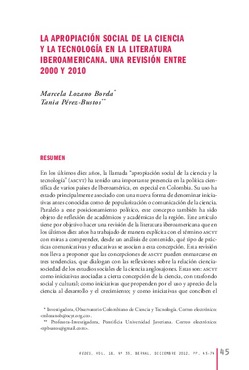La apropiación social de la ciencia y la tecnología en la literatura iberoamericana. Una revisión entre 2000 y 2010
Social appropriation of science and technology within Ibero-American literature. A review (2000-2010)

View/
Date
2012-12Author
Lozano Borda, Marcela; Pérez Busto, TaniaMetadata
Show full item recordAbstract
En los últimos diez años, la llamada “apropiación social de la ciencia y la tecnología” (ascyt) ha tenido una importante presencia en la política científica de varios países de Iberoamérica, en especial en Colombia. Su uso ha estado principalmente asociado con una nueva forma de denominar iniciativas antes conocidas como de popularización o comunicación de la ciencia.
Paralelo a este posicionamiento político, este concepto también ha sido objeto de reflexión de académicos y académicas de la región. Este artículo tiene por objetivo hacer una revisión de la literatura iberoamericana que en los últimos diez años ha trabajado de manera explícita con el término ascyt con miras a comprender, desde un análisis de contenido, qué tipo de prácticas comunicativas y educativas se asocian a esta concepción. Esta revisión nos lleva a proponer que las concepciones de ascyt pueden enmarcarse en tres tendencias, que dialogan con las reflexiones sobre la relación ciencia-sociedad de los estudios sociales de la ciencia anglosajones. Estas son: ascyt como iniciativas asociadas a cierta concepción de la ciencia, con trasfondo social y cultural; como iniciativas que propenden por el uso y aprecio de la ciencia al desarrollo y el crecimiento; y como iniciativas que conciben el conocimiento científico en cuanto bien público. El artículo concluye señalando las implicaciones que tendrían estas tendencias de ser incluidas en la política científica. In the last ten years the term Social Appropriation of Science and Technology (SAST) has had a significant presence in science policy in several Ibero-American countries, especially in Colombia. Its use has been mainly associated with a new way of naming formerly known initiatives of popularization or science communication. Parallel to this political position this term has also been the subject of reflection by scholars and academics in the region. This article aims to review the Ibero-American specialized literature in the last ten years that has worked with the idea of sast. The objective has been to understand, from a content analysis, what kind of communication and educational practices are associated with this view. This review leads us to propose that conceptions of sast can be framed in three trends, in dialogue with reflections on the relationship between science and society of the Social Studies of Science of Anglo-Saxon tradition. They are: sast as ini-
tiatives related to a certain conception of science as a social and cultural knowledge, as initiatives looking forward to increase appreciation of science by society, being this knowledge the base of development and growth, and as initiatives that understand scientific knowledge as a public good. The article concludes by pointing out the implications of these trends if included in science policy.
